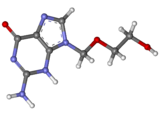Aciclovir (also acyclovir and sold as Zovirax) is a nucleoside analogue that mimics the nucleoside guanosine. It is active against most viruses in the herpesvirus family, and is mainly used to treat herpes simplex virus infections, chickenpox and shingles. After phosphorylation by viral thymidine kinase and cellular enzymes, the drug inhibits the viral DNA polymerase. Extremely selective and low in cytotoxicity, it was seen as the start of a new era in antiviral therapy. Aciclovir was discovered by Howard Schaeffer and colleagues, and developed by Schaeffer and Gertrude Elion, who was awarded the 1988 Nobel Prize in Medicine in part for its development. Nucleosides isolated from a Caribbean sponge, Cryptotethya crypta, formed the basis for its synthesis. Aciclovir differs from earlier nucleoside analogues in containing only a partial nucleoside structure: the sugar ring is replaced with an open chain. Resistance to the drug is rare in people with a normal immune system.
